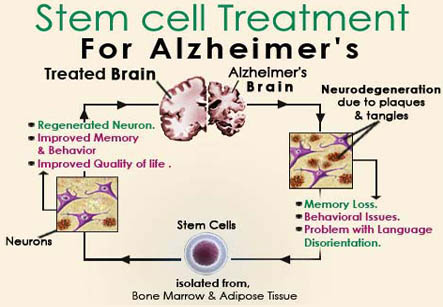Alzheimer’s Stem Cell Therapy
Treatment and Considerations
Alzheimer’s disease is a degenerative disease usually seen in the elderly. It involves loss of function, clarity and processes of the human brain. At first it may begin with increasing frequency in forgetfulness, confusion and difficulty with thinking and reasoning processes and finally end with complete loss of memory of sense of self. There are various drugs to prevent the progress of the condition but none can cure the disease. These drugs moreover fail to provide relief after initial few years of use. Additionally they are all associated with moderate to severe side effects. Also the increasing forgetfulness makes taking regular medications a mammoth difficulty.
Many of these stem cells can come from the cord blood or the blood in the umbilical cord that joins the baby to the mother in the womb.
Iranian scientists have moved to the forefront in embryonic stem cell research, according to a recent joint study by Harvard University and the Massachusetts Institute of Technology

Stem cell research has made a lot of progress in the last few decades. Stem cells are primitive cells in the body that have the capacity to become any cell. In these patients they are coaxed to become and replace the damaged nerve cells of the brain. Stem cells and bone marrow cells have been used since 1968 in patients with blood cancers like leukemia, aplastic anemia, lymphomas such as Hodgkin’s disease, multiple myeloma and even in ovarian and breast cancers.
Many of these stem cells can come from the cord blood or the blood in the umbilical cord that joins the baby to the mother in the womb. After birth the cord blood can be collected and processed to make stem cells. Additionally stem cells may also be obtained from embryos or fetuses. This latter method has quite a few ethical considerations and may thus not be approved in many countries.
Alzheimer’s Stem cell therapy, when tried in patients with early stages of the disease has shown a significant improvement in appetite, sleep, body weigh maintenance, physical conditions. The stem cell therapy is most beneficial in the early stages of the disease rather than in the late stages.
Umbilical cord blood cells have also shown benefits in laboratory animals induced with Alzheimer’s disease. The basic pathology of the disease is formation of specific types of protein clumps in the brain that eats up the nerve cells. These are known as beta amyloid deposits. It has been seen that umbilical cord blood cells have reduce the beta amyloid deposition in mice induced with the condition.
Stem cell therapy for Alzheimer’s disease is still in its rudimentary phases. While much remains to be done, most experts believe early diagnosis is the key to preventing and treating the condition. Most of the clinical and laboratory studies have shown benefits from stem cell therapy in patients with early stages of the disease.